A new, genetically enhanced tomato was recently approved for sale in the United States by the U.S. Department of Agriculture (USDA).
The tomato features a deep purple color from a genetically introduced pigment that boosts the fruit’s nutritional qualities, especially antioxidants.
Boosted Antioxidants
The USDA review confirmed Norfolk Plant Sciences (NPS), a biotech company, successfully created a tomato with levels of antioxidants and anthocyanins—naturally occurring pigments that also have antioxidant properties—similar to fruits typically high in those nutrients, like blueberries. Although other purple tomatoes exist, the genetically engineered (GE) purple tomato has much higher concentrations of those healthy compounds because the whole tomato, inside and out, is purple, not just the skin.
The purple tomato was achieved by introducing two genes from the flowering plants called snapdragons, which “switch on” the preexisting genes in tomatoes to produce high levels of anthocyanins.
NPS is also working on purple tomato seeds that will allow gardeners to grow the GE tomato themselves.
In September, the Animal and Plant Health Inspection Service of the USDA released their review of the tomato. The USDA found the tomato was safe for growing, breeding, and consumption in the United States, concluding the GE tomato is “unlikely to pose an increased plant pest risk compared to other cultivated tomatoes.”
Benefits of Genetic Engineering
Despite some public skepticism, genetic engineering has improved foods and helped make people healthier around the world, says Daren Bakst, a senior research fellow at The Heritage Foundation.
“Genetic engineering helped to save the papaya industry in Hawaii from the ringspot virus and can help develop disease-resistant crops, such as with citrus,” Bakst said. “Then there’s Golden Rice, which is rice infused with Vitamin A to help with the severe health effects of Vitamin A deficiency around the world.”
GE has increased crop yields and reduced production lost to pests, says Bakst.
“There are so many other benefits too, including ensuring affordable and plentiful food,” Bakst said. “Agricultural biotechnology has played a vital role in U.S. agriculture because of the many benefits it provides, with the USDA reporting, ‘over 90 percent of U.S. corn, upland cotton, and soybeans are produced using GE varieties.’”
‘Refinement’ of Classic Techniques
The commonly used term “GMO,” for genetically modified organism, is something of a misnomer, because what is happening is a difference in degree of modification through new techniques, not a difference in kind, says Henry I. Miller, M.D., senior fellow at the Pacific Research Institute and former medical reviewer at the U.S. Food and Drug Administration.
“‘GMO’ is a term loved by activists and certain regulators, but there’s really no such thing, at least the way that it is most often used,” Miller said. “With the exception of wild berries, wild mushrooms and most fish and shellfish, virtually everything in our diets has been genetically improved in some way.”
“The newer, molecular techniques, such as recombinant DNA, ‘gene splicing,’ and gene-editing are extensions or refinements of techniques that have been used for millennia—selection/breeding, mutagenesis, somaclonal variation, and wide crosses,” Miller said.
Let Markets Work
Markets will decide if the new tomato is a success, says Miller.
“The new purple tomato offers consumers another choice in the marketplace,” Miller said. “If they like the appearance, taste, and price, they’ll buy it, and it will succeed in the marketplace; that’s how markets work.”
Some GE products have so far been marketed as luxury goods, says Miller.
“Let’s not get too excited about the new tomato,” Miller said. “The genetically engineered Pinkglow pineapple hasn’t exactly set the world on fire, probably due to the exorbitant price.”
Del Monte’s GE pink pineapple has added health benefits in the form of elevated antioxidants. It costs twice as much as a regular pineapple in stores, which is a price drop from the initial launch at $49 each, and is heavily marketed by Del Monte as an “Instagram-worthy” ingredient.
NPS’s purple tomato will similarly be sold at a “premium price” at launch, the company’s U.S.-based CEO Nathan Pumplin told Wired in an interview. However, Pumplin says the price should come down as a result of greater supply and demand.
‘Relentless Misinformation Campaign’
Despite organized environmental campaigns opposing genetically modified agricultural products, these kinds of modified foods have been on the market for decades, and have been proven safe, say Channa Prakash, Ph.D., dean of the College of Arts and Sciences at Tuskegee University and professor of Crop Genomics and Biotechnology.
“Despite the fact we have had GE foods on the market since 1996, without a single instance of harm ever from these biotech foods, there is continued fear of them for a variety of reasons,” Prakash said. “Some innate apprehension of new foods is understandable, however, a relentless misinformation campaign against this technology from vested-interest groups such as the organic food lobby and Greenpeace is driving more of this fear.”
Consumers are willing to buy innovative products, says Prakash.
“When there are products of biotech such as the plant-based ‘meat’ product Beyond Burger, there has not been any resistance from the public, which has enthusiastically embraced it,” Prakash said. “I believe that when people see new foods based on biotech, such as this burger or the purple tomato, they would welcome it.”
Linnea Lueken (llueken@heartland.org) is a research fellow with the Arthur B. Robinson Center on Climate and Environmental Policy at The Heartland Institute.
For more on genetically modified organisms, click here and here.
